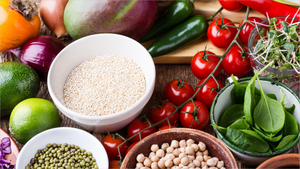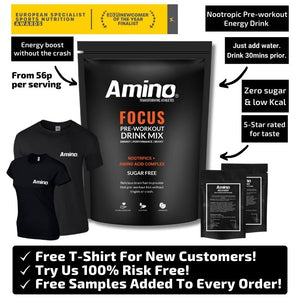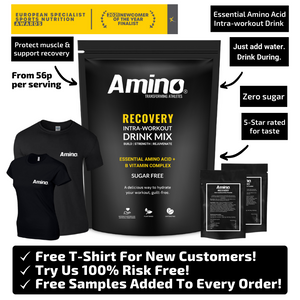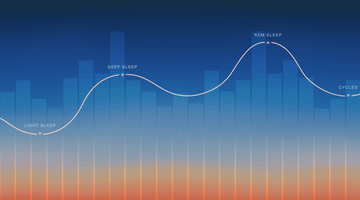A plant-centered approach to your diet provides a strong foundation for health and performance.
Stacy Sims, PhD, Physiology Of The Female Athlete, Author Of ROAR.
Plant-centered or plant-based eating is becoming more and more popular each year. But what is it, exactly? Plant-centered or plant-forward diets prioritise plant-based foods. Nuts, seeds, oils, whole grains, legumes, and beans are some examples of this. However, this does not mean you are a vegetarian or vegan and never consume meat or dairy products. Rather, you are simply making a conscious effort to include foods from plant sources to your meals.
The science-backed benefits of plant-based eating
There's a wealth of nutrition information on the benefits of plant-based eating. Plant-based diets tend to be high in fibre and antioxidants, vitamins, and minerals, which can protect against disease. Plant-based diets are low in saturated fat and cholesterol, which can reduce the risk of heart disease, stroke, and other chronic diseases.
There are several benefits to eating more plants, according to the research:
It's good for your heartA recent study published in the Journal of the American Heart Association, which found that eating a plant-centered diet can protect against heart disease in our young to middle adulthood years, when it typically increases. Researchers found that women and men who who ate more of the "beneficial" plant-centred foods were 52 percent less likely to develop cardiovascular disease. Those who increased their plant-based diet consumption between the ages of seven and 20 were 61% less likely to have future cardiovascular disease if they ate more beneficial plant foods and fewer detrimental animal foods.
It's good for your gut.Eating plenty of fiber-rich fruits and vegetables increases the diversity of your gut microbiome. The gut microbiota is the community of organisms that reside in our intestines and have a significant impact on our well-being. They assist us break down food, create nutrients, resist infections, and so much more. Your gut microbiota also influences your hormones such as estrogen, thyroid-stimulating hormone (TSH), serotonin, and stress hormones.
According to a 2021 study from King's College in London, eating a plant-based diet is linked to an abundance of gut microbes that are associated with a decreased risk of heart disease and other major diseases. According to research, a healthy gut biome can boost your metabolism, energy availability during exercise, and recovery after a workout.
It's anti-inflammatory.Plant foods, particularly fruits (especially berries), vegetables, nuts and seeds, and beans are excellent sources of polyphenols, which are not only beneficial for producing a healthy gut microbiota but also help to reduce inflammation in the body.
It can balance your hormones.Plant foods increase the bacteria that use estrone (the less desirable form of estrogen) as a primary fuel source. The trickle-down benefit here is fewer menopausal symptoms as well as decreased risk of cancer. According to a 2018 research published in Maturitas, peri-menopausal vegans had less bothersome symptoms, such as hot flashes and physical problems like tiredness and aching, than omnivores. More vegetables and fewer animal foods were linked to fewer of both types of symptoms.
It can improve your overall health.The traditional Mediterranean diet, which has a foundation in plant-based cuisine, has been shown in both large population studies and randomized clinical trials to reduce risk of heart disease, metabolic syndrome, diabetes, certain cancers (specifically colon, breast, and prostate cancer), depression, and in older adults, a decreased risk of frailty, along with better mental and physical function.
The different types of plant-based diet
Plant-based diets are available in a wide range of forms and sizes, so find the one that's ideal for you.
- Plant-centered, plant-forward - choosing foods primarily from plants and includes fruits and vegetables, but also nuts, seeds, oils, whole grains, legumes, and beans alongside moderate amounts of sustainably caught fish and humanely grown meat (in moderation), cottage cheese, and other protein-heavy dairies.
- Mediterranean diet - is based largely on plant-based foods, with fish, poultry, eggs, cheese, and yogurt is eaten once or twice a week. Meats and sweets are consumed less frequently.
- Semi-vegetarian or flexitarian - includes eggs, dairy foods, and occasionally meat, poultry, fish, and seafood.
- Pescatarian - includes eggs, dairy foods, fish, and seafood, but no meat or poultry.
- Vegetarian - (sometimes referred to as lacto-ovo vegetarian) includes eggs and dairy foods, but no meat, poultry, fish, or seafood.
- Vegan - strictly excludes all animal foods. Many people choose to adopt a vegan lifestyle to prevent exploitation and cruelty to animals.
Plant-based diets typically offer the average person all the necessary protein, fats, carbohydrates, vitamins, and minerals for optimal health, and are often higher in fiber and phytonutrients. However, some vegans may need to add a supplement (specifically vitamin B12) to ensure they receive all the nutrients required for optimal health. This is because vitamin B12 is mainly found in animal products.
The Plant-Centered Plate
A great way to approach creating plant-centered plate is to think of your food items in layers:
- The Base: Plants! Choose your plant base first; this should account for the majority of your plate. Fill your plate with fresh fruits and vegetables, spinach, roquette, broccoli, and green beans are great choices. Grapefruit, apple, and orange slices, blueberries or raspberries, almonds, walnuts, sautéed mushrooms, peppers, and roasted corn.
- Layer 2: Protein. Think tempeh, legumes, tahini, nuts and seeds, sustainably caught fish (in moderation), lean grass-fed meat (in moderation), cottage cheese, and other protein-rich dairy products are all good sources.
- Topping: Healthy fat and spice. Ginger, sweet chili, tamari and avocado for texture and bursts of flavour.
How to transition to a plant-based diet
Changing your diet and habits can be a challenge. Here are 10 ideas to help you get started on a plant-based diet.
- Eat more vegetables. Fill half your plate with vegetables at lunch and dinner. Make sure you include plenty of colours in choosing your vegetables. Enjoy vegetables as a snack with hummus, salsa, or guacamole.
- Change the way you think about meat. Have smaller amounts. Use it as a garnish instead of a centre piece.
- Choose good fats. Fats in olive oil, olives, nuts and nut butters, seeds, and avocados are particularly healthy choices.
- Cook a vegetarian meal at least one night a week. Build these meals around beans, whole grains, and vegetables.
- Include whole grains for breakfast. Start with oatmeal, quinoa, buckwheat, or barley. Then add some nuts or seeds along with fresh fruit.
- Go for greens. Try a variety of green leafy vegetables such as kale, collards, Swiss chard, spinach, and other greens each day. Steam, grill, braise, or stir-fry to preserve their flavour and nutrients.
- Build a meal around a salad. Fill a bowl with salad greens such as romaine, spinach, Bibb, or red leafy greens. Add an assortment of other vegetables along with fresh herbs, beans, peas, or tofu.
- Eat fruit for dessert. A ripe, juicy peach, a refreshing slice of watermelon, or a crisp apple will satisfy your craving for a sweet bite after a meal.
- Keep it varied. Regularly (or even seasonally) mix up the food you eat and do so across all food groups. This ensures you acquire a broad-spectrum of the macronutrients, vitamins, and minerals your body needs to help you feel your best. Plus it keeps things more interesting.
- Eat the rainbow. Eating different coloured fruits and vegetables on a daily basis might help you get more of various nutrients that may be beneficial to your health in a variety of ways.
Inspiration for plant-based eating throughout the day
Here are some of our favorite sources of plant-centered eating:
- No Meat Athlete - Plant-based recipes designed with athletes in mind.
- Downshiftology with Lisa Bryan - Healthy food with fresh, simple, and seasonal ingredients.
- Steve Grant Health - Tasty and healthy recipes that suit a variety of dietary preferences and therapeutic goals.
Sign up for more tips?
Whether you want to lose weight, build muscle or enhance your performance, our newsletter has practical tips to help you achieve your goals. Sign up today and get 10% off your first order.






